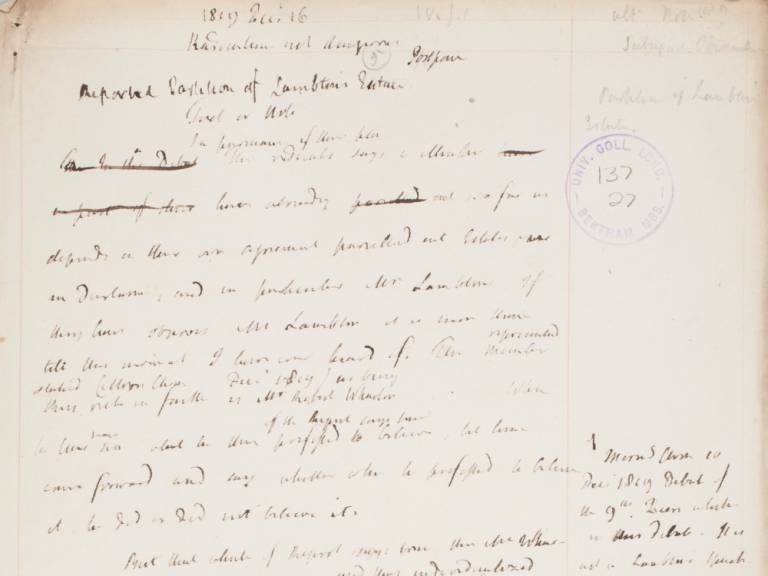Digitisation of Jeremy Bentham's papers now complete
1 June 2018
The central collection of the papers of Jeremy Bentham (1748-1832), the English philosopher and intellectual inspiration behind UCL, have now been completely digitised.

Some 95,000 images from collections at UCL and The British Library have been captured in digital form, making them accessible to interested readers around the globe. This fantastic achievement was overseen by the Bentham Project (UCL Laws), in collaboration with UCL ISD Digital Media, UCL Special Collections, UCL Centre for Digital Humanities and The British Library.
Bentham is perhaps best known for formulating the ethical theory of utilitarianism: the idea that society should be organised to promote the greatest happiness of the greatest number of people. He also cemented his own legacy by requesting that his body be preserved and displayed after his death. Bentham's Auto-Icon is currently exhibited at the Met Breuer museum in New York, although it usually resides in the South Cloisters of UCL.
Bentham was a committed and radical reformer and his papers contain detailed proposals for constitutional, democratic, religious, educational and penal change. He also corresponded energetically with intellectuals and politicians across Europe and the Americas, including James Madison, one of the founding fathers of the United States of America and Simón Bolivar, the military leader who successfully fought to free South America from Spanish colonial rule.
Much of this newly digitised material is already available online via the Bentham Project's crowdsourced transcription initiative Transcribe Bentham and in the digital repository of UCL Library. Over the coming months, the rest of the digitised papers will be uploaded to the websites of UCL Library and The British Library.
"This vast collection of images will help to preserve and spread knowledge about Bentham's radical philosophy and its relevance to modern society," said Dr Louise Seaward, Research Associate at the Bentham Project (UCL Laws). "These images are an invaluable resource for scholarship and public engagement, making it possible for anyone around the world to read Bentham's ideas in their original form."
This programme of digitisation reflects the Bentham Project's continued interest in working with cutting-edge technology to facilitate research and promote access to historical material. Transcriptions provided by online volunteers on Transcribe Bentham are helping to enhance the accessibility of these papers, meaning that Bentham's often difficult handwriting can be understood more easily. Excitingly, these images and their accompanying transcripts also represent a dataset that can be exploited with new digital humanities techniques. As part of its role in the READ project, the Bentham Project is training Handwritten Text Recognition technology to automatically transcribe Bentham's handwriting.
Funding for the digitisation was provided by the Arts and Humanities Research Council, the Andrew W. Mellon Foundation, UCL ISD Digital Media Services and the European Union's Horizon 2020 research and innovation programme. The Bentham Project is also recognised as a British Academy Research Project.
Links
- Bentham Project
- UCL ISD Digital Media
- UCL Special Collections
- UCL Centre for Digital Humanities
- The British Library
Image
- 'Radicalism not Dangerous', Box 137, fol. 27, UCL Bentham Papers, UCL Special Collections. Image courtesy of UCL ISD Digital Media.
Media contact
Jacinta Mulders
Tel: +44 (0)20 3108 6496
Email: j.mulders [at] ucl.ac.uk
 Close
Close

